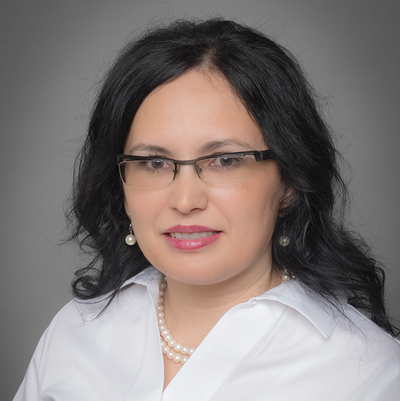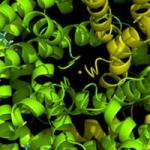
Research Topics
As head of the the Cancer Metabolism Research Program at the Neuro-Oncology Branch (NOB), Dr. Larion observes the direct impact that cancer metabolism has on patient diagnosis, treatment, and outcomes. Because IDH mutations cause metabolic reprogramming, Dr. Larion’s research focuses on exploiting this phenomenon for therapeutic development and imaging studies that aid early diagnosis. Dr. Larion’s laboratory has shown that lipid pathways are important for IDH1-mutant glioma growth, and that targeting specific enzymes from either fatty acid synthesis or the sphingolipid pathway leads to specific cellular death in these cells (see figure).
Intracellular proteins, lipids, and nucleic acids can be quantified at the level of cells and individual organelles using Raman spectroscopy, which Dr. Larion leveraged for this project. Capturing changes in these molecules exposes the intrinsic vulnerabilities of IDH-mutant glioma cells. Studying this disease from various angles leads to better diagnostic, surgical, and therapeutic benefits for patients. Dr. Larion's research could also help create a “metabolomic map," outlining each patient's nutrient availability, mutational profile, and metabolic dependency.
Biography
Dr. Larion trained as a biochemist and biophysicist during her Bachelor of Science degree in Romania, and continued to study these same topics during her Master of Science degree and Ph.D. from Florida State University. In graduate school, her work involved biophysics and enzymology. During this time, she developed a passion for learning about how enzymes function, and how their dysfunction can cause or exacerbate certain diseases. Shortly thereafter, she joined the Neuro-Oncology Branch (NOB) as an investigator, and was introduced to the field of oncology. She now leads the NOB’s Cancer Metabolism Research Program.
In addition to her research, Dr. Larion is also involved in a number of committees. She served as the co-chair of the first NCI-SNO Joint Symposium on Targeting CNS Tumor Metabolism and co-leads the NOB’s Visiting Scholars Program. She has also participated in NIH Grant Review Panels for metabolomics-related research, and organized the Metabolomics Association of North America Conference.
Honors, Awards and Leadership
- Chair, NIH Cancer Metabolism Interest Group - 2021-present
- Member, Metabolomics Society “Precision Medicine Task Force” - 2018-present
- Co-Chair, Neuro-Oncology Branch Visiting Scholars Program - 2016-present
- Co-Chair, 1st NCI-SNO Symposium on Targeting CNS Tumor Metabolism - 2020
- Organizer, 1st Metabolomics Association of North America - 2019
- Performance Award - 2018-2020
- Member, NIH Review Panel for Metabolomics ZRG1 BST-X (50) - 2016
Select Societies and Initiatives
- American Association for Cancer Research (AACR)
- Society of Neuro-Oncology (SNO)
- The Biophysical Society
Selected Publications
- Whittington AC, Larion M, Bowler JM, Ramsey KM, Brüschweiler R, Miller BG. Dual allosteric activation mechanisms in monomeric human glucokinase. Proc Natl Acad Sci U S A. 2015;112(37):11553-8.
- Larion M, Hansen AL, Zhang F, Bruschweiler-Li L, Tugarinov V, Miller BG, Brüschweiler R. Kinetic Cooperativity in Human Pancreatic Glucokinase Originates from Millisecond Dynamics of the Small Domain. Angew Chem Int Ed Engl. 2015;54(28):8129-32.
- Larion M, Salinas RK, Bruschweiler-Li L, Miller BG, Brüschweiler R. Order-disorder transitions govern kinetic cooperativity and allostery of monomeric human glucokinase. PLoS Biol. 2012;10(12):e1001452.
- Larion M, Salinas RK, Bruschweiler-Li L, Brüschweiler R, Miller BG. Direct evidence of conformational heterogeneity in human pancreatic glucokinase from high-resolution nuclear magnetic resonance. Biochemistry. 2010;49(37):7969-71.
Related Scientific Focus Areas


Molecular Biology and Biochemistry
View additional Principal Investigators in Molecular Biology and Biochemistry



This page was last updated on Friday, June 28, 2024